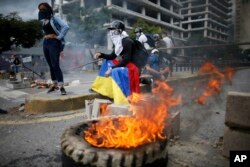The Trump administration's decision on Wednesday to slap sanctions on eight members of Venezuela's all-powerful constitutional assembly brings to 30 the number of government loyalists targeted for human rights abuses and violations of democratic norms since anti-government protests began in April.
But even as the list of targeted individuals grows longer, promised economic sanctions have yet to materialize amid an outcry by the U.S. oil industry that a potential ban on petroleum imports from Venezuela — the third-largest supplier to the U.S. — would hurt U.S. jobs and drive up gas costs.
The sanctions announced Wednesday focused on current or former Venezuelan government officials accused by the U.S. of supporting President Nicolas Maduro's creation of a special assembly charged with rewriting Venezuela's constitution — a move the U.S. says is an attempt by Maduro to shore up his grip on power.
Since its election last month, the 545-member assembly has declared itself superior to all other government institutions and ousted Venezuela's chief prosecutor, a vocal critic of Maduro.
The U.S. Treasury Department took the unusual step of sanctioning Maduro himself last month, freezing any assets he may have in the U.S. and blocking Americans from doing business with him.
Newest additions
The newest additions on Wednesday include Adan Chavez, the older brother of Hugo Chavez, who is credited with introducing the late president to Marxist ideology in the 1970s, and a national guard colonel lionized by the government after he physically shoved congress President Julio Borges during a heated exchange caught on video.
While most Venezuelan officials wear U.S. sanctions as a badge of honor — and are frequently rewarded with promotions as a result — Maduro faces a far greater threat if Trump follows through on economic sanctions against the OPEC nation.
For all of Maduro's anti-capitalist rhetoric, Venezuela, which sits atop the world's largest oil reserves, remains highly dependent on oil exports to the U.S., especially for importing food and medicine — items in short supply as crude prices have fallen and triple-digit inflation wreaks havoc on the economy.
The Trump administration warned last month that it would take "strong and swift economic actions" against Maduro if he went ahead with plans to seat the constitutional assembly.
But since the election last month, no such action has materialized, leading some of Maduro's opponents to wonder whether the U.S. president has lost his nerve.
Venezuelan crude and the U.S.
The prospect of an import ban has alarmed U.S. oil companies that rely on Venezuelan crude.
Nine companies, including Chevron, Valero, Citgo and Phillips 66, currently process Venezuelan crude in more than 20 U.S. refineries, most of them located along the Gulf Coast, according to data from the U.S. Energy Information Administration. Many of these refineries are designed for the type of heavy crude that Venezuela exports and replacing those supplies would be disruptive and costly.
An influential industry group whose member include the nine companies has written two letters to Trump warning there is no guarantee that other key sources of U.S. crude imports — Canada, Mexico and Colombia — could provide enough additional supply to replace the Venezuelan oil. Many refineries would likely turn to Saudi Arabia but the higher costs associated with such a shift "could significantly impact fuel costs for U.S. consumers," according to the letter by the American Fuel & Petrochemicals Manufacturers.
"We want to make sure that we don't have the unintended consequence of doing more harm to U.S. refineries than the Maduro regime," said Chet Thompson, the CEO of the group, which represents 95 percent of the U.S. refining sector.
He added that he is hopeful his lobbying is gaining traction.
"We think we've come a long way from early July when these sanctions were first being kicked around. ... We think folks are a lot smarter on this issue than they used to be," he said. "We certainly have not received any commitments or promises as far as what they are going to do. But we have done our job."
The oil industry is finding allies in the U.S. Congress, particularly among lawmakers from the Gulf states.
Six Republican congressmen from three of the states that process Venezuela's heavy crude — Texas, Mississippi and Louisiana — recently wrote a letter to Trump warning that banning Venezuelan oil imports would do more harm than good. While applauding the president for his efforts to counter "the disturbing decline of democracy" in Venezuela, the lawmakers, led by Rep. Randy Weber of Texas, said that it could jeopardize 525,000 refining-related jobs along the Gulf Coast.
"We fear that potential sanctions will harm the U.S. economy, impair the global competitiveness of our energy business and raise costs to consumers," according to the July 28 letter, a copy of which was provided to The Associated Press by a senior Venezuelan official and whose authenticity was confirmed by one of the signatories, Rep. Clay Higgins of Louisiana.
Some Senate Republicans could soon join the chorus. Sen. Bill Cassidy, a Louisiana Republican who sits on the Senate Committee on Energy and Natural Resources, is preparing a letter to Trump raising similar concerns about the impact on the U.S. fuel market, according to his spokesman, John Cummings, who said the senator is rounding up signatories.
Energy analysts, however, have been more circumspect about the effect on global markets and prices at the pump. A recent analysis by Wells Fargo Securities concluded that one impact would be to raise foreign heavy crude prices by about $3.50 a barrel. However, the ban would not affect demand for gasoline or reduce the overall supply of crude on the global market, as Venezuela would likely redirect its shipments to countries in Asia and elsewhere, albeit at a painful discount.
"We do not believe there would be significant impact on retail prices to U.S. consumers given that the net availability of worldwide crude oil volumes would be unchanged," the Wells Fargo report said.






